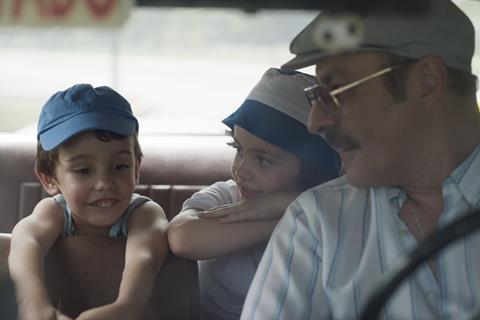Paz Vega takes a child’s eye view of domestic violence in her 1980s Seville-set directorial debut

Dir/scr: Paz Vega. Spain. 2024. 94mins
Extending an acting portfolio that has taken her from the Spanish auteur cinema of Julio Medem to Rambo V: Last Blood, Paz Vega brings it back home with her subtle and potent directorial debut, a 1980s childhood drama which is set in Vega’s hometown of Seville. Mixing rose-tinted nostalgia with the dark theme of gender violence means walking a tricky tightrope, but Rita’s authentic attention to detail, fine performances and carefully honed atmospherics make it work, merging the child’s-eye view with the adult perspective on that childhood.
Subtle and potent
That, together with the film’s move away from the simplistic tourist view of the city to reveal the violent patriarchal structures on which it is built, should help awaken fest interest beyond Locarno, where it premiered, and Valladolid, where it plays out of competition.
Rita opens with the sound of a whirring fan, just one of its many small summertime-in-Seville details. School’s out for summer and seven-year-old Rita (Sofía Allepuz) and her timid, sensitive little brother Lolo (Alejandro Escamilla), of whom she is fiercely protective, are desperate to head for the beach.
Their mother Mari (Vega) has the gaunt, haunted look of someone in constant pain – and indeed she is, suffering perpetual verbal and physical abuse at the hands of her taxi driver husband, the balding, moustachioed and terminally machista Jose Manuel (Roberto Alamo). Jose Manuel’s brooding, awful presence can be felt even when he’s not there, though space is made for one scene of tenderness that shows he is not a pure monster.
Great care is taken not to sentimentalise Rita; in her first role, Allepuz keeps the character real through sideways observations and awkward questions. But though the film is seen through Rita’s eyes, this is perhaps Mari’s story, as a woman living not just under her husband’s thumb but under the regime of Franco, lingering on past his death.
“When your husband seeks distractions,” the radio informs the women of Spain, “it means he’s healthy.” Divorce in Spain has just been made legal and, hesitantly, Mari sets about calling a lawyer to make enquiries – a rebellious and dangerous act in itself. Delicate parallels are made between Mari’s dreams of escape, and those of Rita and Lolo – whether to the beach or into an imagined land of cowboys, where they go when Jose Manuel’s anger becomes too much for them.
Rita enters a slightly off-kilter friendship with Nito (Daniel Navarro), the son of a neighbour, with whom she’ll have her first, early taste of what a summer romance might one day look like – though this, like everything else in Rita, is permeated by a sense of peril and sorrow.
Life in the streets of a working-class Seville barrio in 1984 is authentically rendered, and the sense that Vega’s own childhood is being faithfully recorded comes over loud and clear. We get the World Cup of that year continuously on the radio, the fairground visits, coins being thrown from balconies to the gitano in the street below, with his goat balanced on a stool. We get the itinerant knife-grinder, whose role in the film will turn out to be more than just local colour, and a rare scene of unbridled joy in which Rita starts to learn how to dance flamenco from her Aunt Merche (Amada Santos): the implication being that dance is not something that’s allowed to happen at home.
Rita is let down, though, by its occasional reliance on cliché. Boxes are duly ticked by a child enjoying the feel of the wind on her face through an open car window, and by a vertical shot of kids staring up at the sky and finding shapes in the clouds. Pablo Cervantes’ score is simple and touching but overused, bringing one or two scenes dangerously close to mawkishness in a film which has otherwise managed to sidestep the sentimental.
Production companies: Aralan
International sales: Filmax filmaxint@filmax.com
Producers: Marta Velasco, Gonzalo Bendala
Cinematography: Eva Díaz Iglesias
Production design: Amanda Román
Editing: Ana Alvarez Ossorio
Music: Pablo Cervantes
Main cast: Sofía Allepuz, Alejandro Escamilla, Paz Vega, Roberto Alamo, Alejandro Escamilla, Amada Santos, Daniel Navarro
























